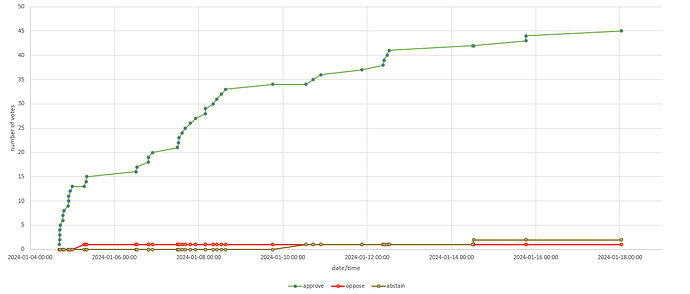The voting periode is over. Thank you to all of the 48 people who participated.
According to the proposal process, a proposal is approved if at least 8 people give an approval vote and at least 75% of the votes are approval votes. We reached 45 approval votes with 1 opposing vote and 2 abstaining comments. That gives us an approval rate of 97,83%. I am more than happy with the result. ![]()
![]()
![]()
However, the proposal process page also states, “all suggestions should be taken into account before a proposal is approved or rejected”. So here is a summery of the comments that where made while voting:
- @riiga, approving: “Good proposal to unify tagging”
- @Warin61, opposing: “The definition is too restrictive. Certain SES units primarily exist to responed to road accidents. Possibly a secondary tag disaster_response=* to detail the disasters catered to?”
- @Polarbear, approving: “and thanks Os-emmer to continue the work here.”
- @gendy54, approving: “Why limit it to non-military stations? In France, these are military stations and this tag fits the situation well. The operator tag can be used to distinguish between cases.”
- @chris66, abstaining: “I’m fine with the existing tags”
- @SomeoneElse, abstaining: “Whilst it might make sense for Australia or other places that have this infrastructure, we’ll no doubt see these “local” tags appear in error elsewhere, like the previous attempt did at https://www.openstreetmap.org/way/484207497”
- @DnaX, approving: “Very useful also for the Italian “Protezione Civile” (see wiki:en)”
Here are my comments on the critics with some questions:
→ 2. Finding the fine line between too restrictive and too loose is difficult. As my knowlege about the SES is very limited, it is hard for me to imagine how such a station looks like. A car crash is more or less an antrophogenic disaster. @Warin61 Are these stations completly focused on raod accidents? Or are the members of such stations also in service in other disasters like storms or blackouts?
→ 4. The limitation to non-military stations was motivated by the thought that otherwise in a lot of countrys every military base would need to be labeled emergency=disaster_response as soldiers are in peace times often used for tasks like filling sand bags in floods. The US-National Guard was sugested to be included into the proposal, but as they are an armed force focused on weapon-using-situations we decided to not include them. I think during the disussion we had noone speaking about the situation in France so we may have overseen something. Can you @gendy54 explain a little bit about the French military bases you mean? Are they purly existing to help in not-war-disasters? Are the members armed? What tools/vehicles do they use?
→ 5. I understand that deprcating existing schemes is always a challenge. But in my view, the one time “pain” of change is better than keeping the different tags with a very simmilar meaning that evolved in different countrys.
→ 6. I am not sure if I understand your @SomeoneElse comment correctly. Are you commenting to tell that you see a high risk of missuse of emergency=disaster_response? If yes, why exactly?
Even though we reached an astonishing 97,83% of approval, I would like to not just set the status to “approved” now. My plan is:
- Hear some other oppinins on these comments that where given during vote.
- Learn from these oppinions what and what not to exactly clarify in the wiki.
- Edit the wiki pages as described here.
- Contact data consumers that could be affected by this proposal about the changes made to prevent anything from breaking unexpectetly. I started a list, feel free to expand it.
- Start editing according to new scheme. I am already planing a mass edit for the “Ortsverbände” (local stations) of the German THW.
Sorry for writing so much. Thank you to @Polarbear for initiating the proposal over 3 years ago, thank you to @Fizzie41 for creating this thread to advertise the proposal and thank you to everyone who participated by commenting, voting or helping during the proposal process in any way.
